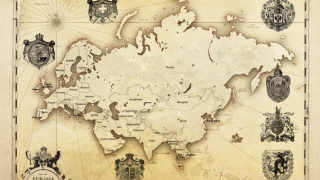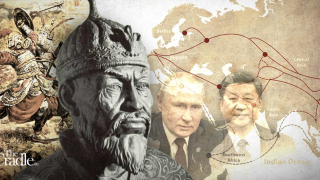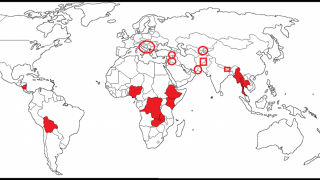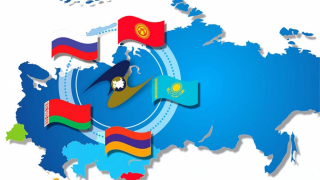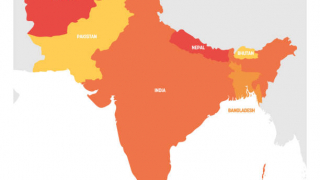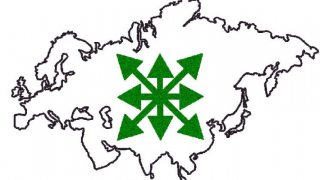Eurasian Geo-economic Space: Business, Development, Security
07.10.2020
The article examines the fundamental concepts of the development of the Eurasian geo-economic space, offers a value paradigm for the development of the Eurasian space. The analysis of supranational structures and institutions influencing the development of the Eurasian institutions is carried out. Within the framework of the article, have been identified mechanisms that would ensure
security and progressive development of the countries of the Eurasian space.
The comprehensive or fundamental concept of all the topics mentioned and the very name of the conference is the notion of the Eurasian geo-economic space. The starting point could be some kind of temporary definition of the Eurasian geo-economic space. This is possible to achieve because geo-strategic foundations have already been laid (EAES, CSTO, SCO,...), and there are also governing bodies dealing with individual business sectors. When there are such bases, it is possible and necessary to shape a practical system of action - in Platonic terms, after the "world of ideas" is established as clear.
One of the topics is the ‘crisis of ideas’. But the question is whether there is a crisis of ideas or whether certain business norms (West-centric, liberal, megalomaniac) are subtly and persistently imposed on people, which all have little to do with Eurasian norms, both business and life. It does not seem to be a crisis of ideas, but a crisis of practical action and ingenuity, to use all available resources and establish one's own business habits and norms, regardless of the disintegrating megalomaniac and savage capitalism.
Thus, if we move in cascades from the idea to practical agency, it is appropriate to apply some other principle, some other wisdom than one connected to ideas. Plato's student, Aristotle, learning from his great teacher and applying deep teacher’s insights to the "practical world", wrote in Nicomachean ethics that there are two types of wisdom, theoretical (σοφία) and practical (φρόνησῐς). The etymology of ‘practical wisdom’ is related to ‘think’ and ‘understand’. In the treatise "On Virtues and Vices," attributed to Aristotle, practical wisdom is defined as “the wisdom to receive counsel, to judge good and evil, and all things in life that are desirable and to be avoided, to use all available property in a fine way, to behave properly in society, to respect deadlines, to speak and act on the basis of common sense, to have expert knowledge about all things useful."
In order to determine the practical concept of the Eurasian economic space, it is necessary to have concrete insights and analysis of existing national economic models and to determine the hubs or knots which may be useful for better and more efficient business connections.
One of important practical issues is the security of geoeconomic Eurasian space. It is not just about the interconnectedness of the security sector of the Eurasian countries and, more specifically, the sector for surveillance or security of economic relations and cooperation - it is also about which other economic arrangements countries are involved in, how much and in what way they are related to the World Bank or International Monetary Fund or to Western investment banks, funds, etc. Dependence on neo-colonial financial institutions cannot bring anything good to the draft development of any national economy or to development of Eurasian economic space. Such arrangements slow down, complicate, disrupt, and in some cases, in some states, directly impede the development of the national economy. That is another reason why the issue of security is closely related to economic relations. Having in mind the liveliness and constant acceleration, branching of different types of business relations and elaborated mechanisms for their constant metamorphoses, it is necessary to pay special attention to the issues of security of geo-economic relations within the Eurasian space. Just as there are the Collective Rapid Reaction Forces of the CSTO, which are composed of elite units of the armed forces of the member states, so there should be rapid reaction forces, as economic relations and business can be considered fertile ground for unarmed forms of aggression in Eurasia.
The reason may also be terrorism, which is usually financed from illicit business relations and economic transfers. On the other hand, the questions of general definition of terrorism, terrorist activity and who is a terrorist are still open, because in different parts of the world, different groups have been declared (or have not been declared) terrorist. However, that in no way prevents them from using various mechanisms for obtaining funds, from anywhere on the planet, wherever the terrorists themselves were and with whomever they cooperated.
Although the CSTO says that both observer states and CSTO member states can cooperate with the NATO, it seems that for the maintenance, development and security of practically active Eurasian economic space, it would be better if such cooperation did not exist until the NATO withdraws its troops from countries it illegally occupied and usurped militarily. If the NATO pact behaves like a terrorist organization, then organizing any security protocols with them is the same as doing it with any of the terrorist groups that NATO supports around the world. It may seem that NATO pact may look like unimportant for economic relations in the Eurasian space. However, where the EU is, there is also NATO. Sometimes, NATO is there, the EU is not, or vice versa, but it is all the same, more or less. It could even be said that the EU is the political wing of the NATO military alliance. However, that political wing of military alliance goes deep into the national economies of both European and Asian or African countries. Even NATO sometimes behaves like one big company, and not like a military-political alliance.
Another reason for establishing something similar to Collective Rapid Reaction Forces of CSTO, but for security of economic affairs in Eurasian geo-economic space is the problem with illegal, but organized migrations from Asia and Africa to Europe. Illegal migrations might be connected to terrorism and organized crime – which makes things even more bizarre, because illegal migrations of individuals with no identity are under patronage and protection of supranational organizations such as certain UN sectors and departments, International Organization for Migrations, etc, or under patronage of multinational companies like Visa Inc.
Having in mind the intertwining of geo-economic relations in physical and virtual space, one can (once again) come to the conclusion that maintaining secure geo-economic relations in Eurasia is one of the key elements.
One way to improve the Eurasian geo-economic space is to consider the issue of transport and communications - better transport will mean faster flow of goods and services, shorter travel time for people. In that sense, modern technologies can be helpful, but only to the extent that they do not interfere with human, social relations. And, as far as the economy is concerned, they can be useful, in case they improve business processes, while preserving the existing national economies or customs in business. The issue of transport and human communications is, again, closely linked to the issue of security. From the safety of land, river or air transport to passenger lines.
Resolving the issue of transport and passenger infrastructure should be related to the cooperation of state administrations of Eurasian countries - this is the only way to create a reliable network of roads, railways, river ships, air corridors in the Eurasian geo-economic space - with strict security control. design, as well as in the construction of these infrastructures.
The experiences of dissolution of the Soviet Union and Yugoslavia, the wars in West and Central Asia and Africa, the development of new types of organized crime, street gangs - we see this now also in the United States – demands new approach to securing a ‘large Eurasian space’ of large and small countries, technologically advanced or not, with different state and social arrangements, with different Constitutions. That is why it is important to create rapid reaction forces for economic affairs in Eurasian geo-economic space, skilled and trained for unarmed forms of aggression and for networked unarmed actions and composed of members of different nations and ethnic groups, who speak different languages and dialects, who are experts in various fields and are well versed in economic relations and mechanisms.
It is especially important, regardless of unavoidable presence of modern telecommunication means and platforms, to preserve traditional practice in communication between different nations or ethnic groups. Modern technologies should be present, but in a way that does not change everything radically because of them, as it is the case in the West where it turned out that they only got robocops and zombie apocalypse. Natural human communication is gestural and verbal, exposed to the senses and common sense of interlocutors. Switching a person to the screen or ignoring any of the sensory experiences or gestures also means narrowing the field of communication, topics, understanding, agreement. Personal and direct communication are especially important when concluding certain deals or establishing and developing economic relations.
Economic relations include all forms and volumes. From crafts and artisans, individual farmers or cooperatives, to small and medium enterprises and beyond, to large companies. In that sense, a transport network should be created, for various good and quantities - economic relations can take place at the state, regional or local levels.
Another important thing in creating a sustainable Eurasian geoeconomic space are the criteria of quality and quantity.
The globalist neo-liberal, megalomaniac and numerical-statistical political economy has dragged the whole world into a senseless hatch of large and meaningless numbers, percentages. Therefore, it is first necessary to shift the entire Eurasian economic context from the evaluation based on the values of the Western neo-liberal economy. Own criteria and standards of quality and quantity are required, and they could be the result of joint work and consideration, study of existing economic relations and business, what they are based on, and what their perspective is, at the interstate, regional or local levels in Eurasia.
It is important to pay special attention to old crafts, goods with geographical origin and to intellectual property, because that is exactly how the countries and peoples of Eurasia are promoted and represented at first. It is also important for countries to preserve their national symbols, costumes, their music, poetry, etc. It has not once happened that some intellectual property or some tangible or intangible heritage from Eurasia ended up in some bizarre music video or even more bizarre fashion show, such as those made in London, for example.
When it comes to quantity, it is necessary to keep in mind that the Eurasian space can also be about large numbers. However, it should also bear in mind that there are large and small countries in Euroasia, megalopolises where there are large productions, as well as villages, where people are actively engaged in some old crafts of small quantities. Due to differences in the size of the territory and market, it is important to consider the establishment of such transport links and communication infrastructure, which will facilitate trade, commerce and any other type of business relations large and small, rather than requiring changes in order to introduce technocratic business model. Technocracy, when well educated and skilled, should be able to adapt technocratic models to any human needs, including to different types of business relationships.
Standardization and homogenizations imposed by Western or multinational companies are impossible within Eurasian geo-economic space. It requires different value criteria, different scales for the participants in various existing business relations. This requires the cooperation of various experts from Eurasian countries, the skills of fitting and merging of different or compatible national economies, trade or craft traditions. Mapping and marking of geo-economic space of Eurasia is important, both as a strategic and as a practical step for the best possible business conduct.
It is important to note that one should be careful about the application of digitalization and the transfer of all possible data into digital form - not only for security, but also for the preservation of human and traditional social relations. Removing people from physical space and transferring them to cyberspace leads to everything that does not go in line with founding Eurasian postulates about man, humanity, tradition, cooperation among many peoples, nations, ethnic groups.
Alexandr Dugin has spoke recently about a new phenomenon today - a closed society. It emerged as consequence of corona circus. Mapping and marking of the Eurasian geo-economic space - in administrative and international terms, can be useful in achieving its sustainability and development. Regardless of the fact that closed societies came as a consequence of social engineering, psychological and biological warfare, the process of closure and action in new conditions can gather people around own goals. A closed society is a good opportunity to reflect on social opportunities and adversities and to plan well and implement realistic economic and other programmes.


